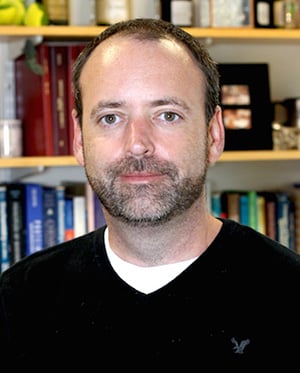Paul Thompson, PhD
Director of the Program in Chemical Biology; Professor of Biochemistry & Molecular Biotechnology; Endowed Chair in Biochemistry & Molecular Biotechnology I
Dr. Paul Thompson received his BSc and PhD degrees from McMaster University in Canada before moving to the US to take a postdoctoral position with Philip Cole at the Johns Hopkins School of Medicine. Paul then moved to the University of South Carolina to begin his independent career before moving to the Department of Chemistry at The Scripps Research Institute, Scripps Florida, in May 2010. Paul subsequently moved to UMass Chan in August 2014. Paul has published more than 200 articles in major scientific journals including Nature, Cell, Nature Structural and Molecular Biology, and the Journal of the American Chemical Society. Paul has also won a number of awards including a Canadian Institutes of Health Research Postdoctoral Fellowship and a Camille Dreyfus Teacher-Scholar Award. He is a Fellow of the Royal Society of Chemistry. Paul has founded several biotech companies including Danger Bio and Padlock Therapeutics, which was acquired by Bristol Myers Squibb.
Office Location: LRB 825
Lab Location: LRB 860 B, C, E
Phone: 508-856-8492
![]()
Mentoring Statement:
My goal is to foster the development of creative and independent young investigators. I accomplish this goal by focusing on five key areas: research, verbal communication, writing, ethics, and personal development. Based on my extensive mentoring experience, these areas are the most critical for a successful career in the sciences.
Research
To develop creative and independent investigators, I routinely meet with trainees weekly to discuss their research progress and future plans. Additionally, we meet on a more informal basis in the lab at least 2 times per week to discuss their research progress and the latest developments in science at the interface of chemistry, and biology. I also encourage trainees to attend one of the many seminars given each week so that they may learn effective methods of scientific communication. These seminars cover all facets of the biomedical sciences from Neuroscience, to Cancer Biology, to Immunology, to Chemical Biology.
Verbal communication
I work closely with trainees to improve their communication and presentation skills. To further nurture and improve their communication skills, trainees are required to present five to six times a year during our weekly research and journal club meeting. These are formal ~45 minute presentations that provide students with experience in presenting their research to a broad scientific audience. Trainees also participate in weekly ‘Research in Progress Seminars’ that are given every Friday at 4 pm in our department. I also encourage trainees to attend at least one scientific meeting per year.
Written communication
I provide all trainees with additional training in paper writing, grant writing, and paper reviewing. For example, trainees are required to write the first drafts of their papers. I then edit these and discuss with them the specific reasons why the changes in formatting, language, and substance are made. With respect to grant writing, I typically ask trainees to write in areas pertaining to their research and to edit/review the entire document. I read their drafts and provide suggestions for modification. This aspect of our training program not only provides students with experience in ‘grantsmanship’, but also aids their preparation of a better grant.
Ethics
The ethical conduct of science is critical for the future success of any scientist, and I instill in trainees the highest ethical standards by our own example. I meet with trainees weekly and go through their primary data and lab notebooks. Trainees are also required to attend the “Responsible Conduct of Research (RCR)” course offered by UMass Chan Medical School. To ensure rigor, all experiments will be performed at least in triplicate and key experiments will be repeated by a second trainee.
Personal development
As a key part of a student’s training plan, I foster their personal development by discussing their future career plans during our weekly meetings. Although many students are interested in a career in academics or industry, I also discuss alternative career pathways. To foster their personal development in the lab, I also increase their responsibilities to provide them with the experiences and traits necessary to run their own research group. Trainees also mentor undergraduate and high school students so that they gain teaching experience in the laboratory.
